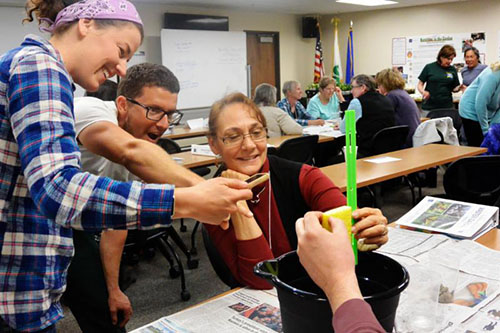 If you have chatted with a Master Gardener volunteer, you know their passion for gardening and vast horticulture knowledge. Maybe your friend is a Master Gardener, or your grandma was one, and her garden was spectacular, or your neighbor is a Master Gardener and his lawn is always healthy looking. Have you ever wondered what they do exactly and why it seems gardening comes so naturally to them?
If you have chatted with a Master Gardener volunteer, you know their passion for gardening and vast horticulture knowledge. Maybe your friend is a Master Gardener, or your grandma was one, and her garden was spectacular, or your neighbor is a Master Gardener and his lawn is always healthy looking. Have you ever wondered what they do exactly and why it seems gardening comes so naturally to them?
Master Gardener volunteers go through an extensive, in-depth, two-and-a-half month training on gardening in Nevada. They learn science-based information from lectures and hands-on activities led by subject matter experts. Once Master Gardeners complete the initial training, they become a part of something greater than themselves.
The Master Gardener volunteer program is not just a service to the community; it’s also a community itself. Within the Master Gardener community, volunteers form lasting friendships that continue to grow due to a shared passion: gardening.
Monthly potlucks provide volunteers with social time to share their garden with others. Often, someone will bring heirloom seeds or produce from their harvest to share. Public events give Master Gardeners a chance to meet and educate the local community.
For the more hands-on gardeners, the Master Gardener program has demonstration gardens and opportunities to volunteer at local school gardens, teaching nutrition-based educational programs to children.
The Master Gardener program has a little for everyone and serves Washoe County through the Cooperative Extension horticulture office in Reno.
The horticulture office is open Mondays, Tuesdays and Thursdays from 10 a.m. to 2 p.m. during the off-season. There, Master Gardener volunteers answer horticulture questions from the public by email, over the phone and in person. While in the office, volunteers spend time researching horticulture topics, focusing on areas they’re interested in or often receive questions about.
As one Master Gardener, Karen, put it, “joining the program gave [her] a structure for lifelong learning and teaching in gardening.”
Karen said she learned about a lot of topics at a high level during the training program, and she said she was inspired to dig after the program was over into her areas of interest and into often-requested topics.
Last year, over 400 Nevada Master Gardener volunteers put in more than 58,000 hours of service statewide to educate local communities on a variety of horticulture topics. Every year, the list of northern Nevada volunteers expands by 25 as graduates finish the Washoe County Master Gardener training program.
In 2018, the program will be held 12:30 to 3:30 p.m., Tuesdays and Thursdays, Jan. 30 through April 12, at 4955 Energy Way in Reno. The cost is $275 and includes expert seminars on botany, plant care, plant insects and disease, turf management, fruit trees, vegetables, irrigation principles, weed identification, plant problem diagnosis and more!


